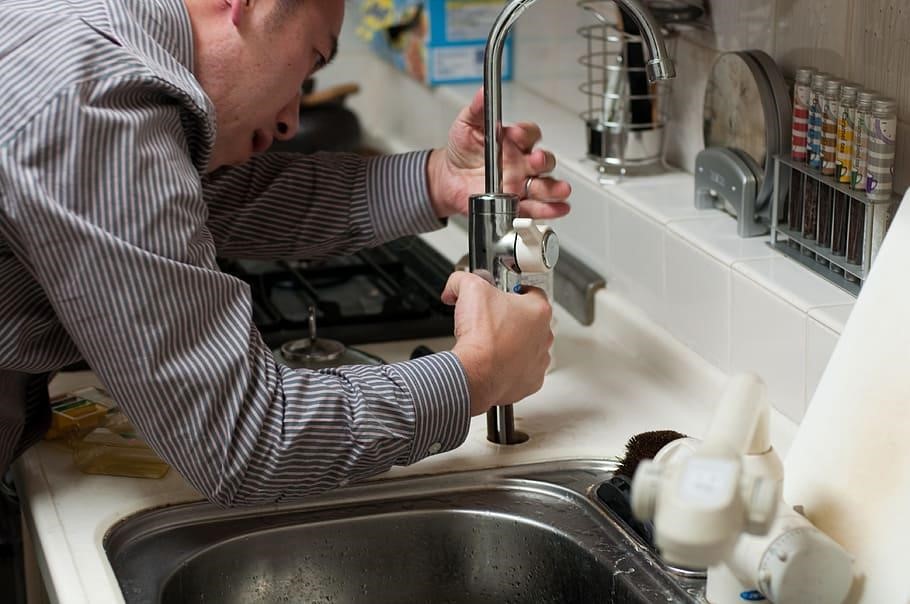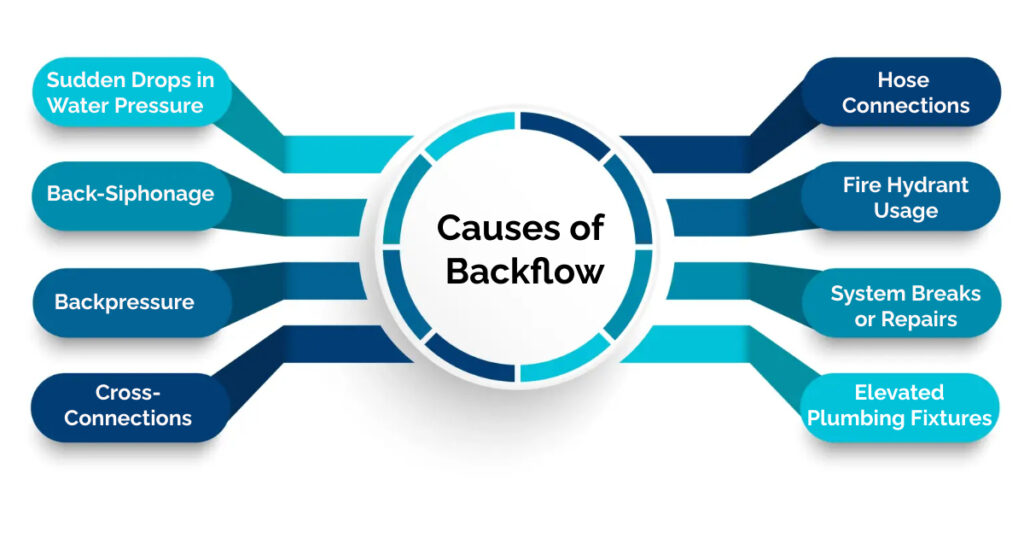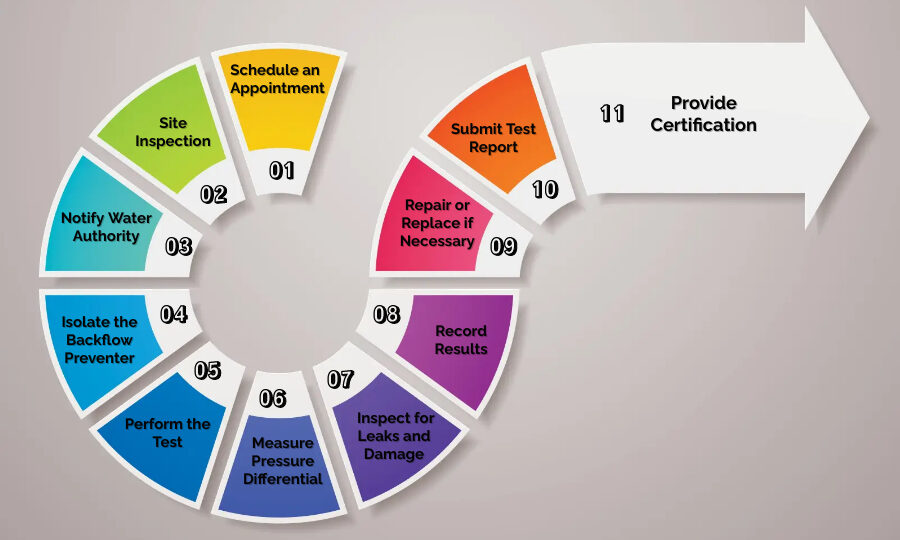At Gator Plumbing of South Florida, we prioritize the safety and purity of your water supply through meticulous backflow recertification services. Our team is dedicated to ensuring that your plumbing system meets the highest standards, protecting you from the risks associated with backflow.

What is Backflow?
Backflow occurs when water flows in the opposite direction, potentially bringing contaminants into your clean water supply. It’s a serious concern that demands attention to maintain water quality and ensure the health and safety of your community.
Frequently Asked Questions
Understanding the causes of backflow is crucial for implementing effective backflow prevention measures and safeguarding the integrity of the water supply system.
-
Sudden Drops in Water Pressure:
– Rapid changes in water pressure can create a pressure difference, leading to the reversal of water flow.
-
Back-Siphonage:
– This occurs when there is a drop in pressure in the water supply system, causing water to be drawn back into the system from a lower-pressure source.
-
Backpressure:
– When the downstream pressure exceeds the supply pressure, it can force water to flow backward, carrying potential contaminants with it.
-
Cross-Connections:
– Improperly designed or installed cross-connections between potable water and non-potable water sources can contribute to backflow.
-
Hose Connections:
– Leaving hoses submerged in containers or connected to chemicals can create a direct pathway for contaminants to enter the water supply.
-
Fire Hydrant Usage:
– A sudden and high demand for water, such as during firefighting activities, can result in a drop in pressure and potential backflow.
-
System Breaks or Repairs:
– Inadequate protection during system breaks or repairs can expose the water supply to contaminants if precautions are not taken.
-
Elevated Plumbing Fixtures:
– Plumbing fixtures located above the main water supply can contribute to backflow if not properly protected.
If you have concerns about backflow or need professional assistance, contact Gator Plumbing of South Florida at (954) 427-5882
Backflow testing is a crucial process to ensure the integrity of a plumbing system and prevent the reversal of water flow that could lead to contamination. Here are the general steps involved in backflow testing:
-
Schedule an Appointment:
– Contact a certified backflow testing professional, like Gator Plumbing of South Florida, to schedule an appointment for the testing.
-
Site Inspection:
– The certified technician will conduct a thorough inspection of your plumbing system to identify the location of the backflow preventer valve and assess its accessibility.
-
Notify Water Authority:
– In some cases, the water authority or local municipality may need to be notified before testing. The certified technician will ensure compliance with any necessary regulations.
-
Isolate the Backflow Preventer:
– The technician will isolate the backflow preventer from the rest of the plumbing system to ensure accurate testing.
-
Perform the Test:
– Using specialized equipment, the technician will conduct the backflow test. This typically involves simulating different scenarios to check if the backflow preventer functions as intended.
- Measure Pressure Differential:
– The technician will measure the pressure differential across the backflow preventer to ensure it is within acceptable limits.
-
Inspect for Leaks and Damage:
– A visual inspection will be conducted to check for any signs of leaks, damage, or wear on the backflow preventer.
-
Record Results:
– The technician will record the test results, including pressure readings and any issues identified during the inspection.
-
Repair or Replace if Necessary:
– If the backflow preventer fails the test or shows signs of damage, the technician will discuss repair or replacement options with the property owner.
-
Submit Test Report:
– In some cases, the testing results need to be submitted to the local water authority or relevant regulatory body for documentation and compliance purposes.
-
Provide Certification:
– Upon successful completion of the test, the technician will provide a certification that verifies the proper functioning of the backflow preventer.
Regular backflow testing is essential to ensure the ongoing safety and compliance of your plumbing system. If you’re in South Florida and need professional backflow testing services, contact Gator Plumbing at (954) 427-5882 for reliable and expert assistance.
A backflow preventer is a critical component of a plumbing system designed to prevent the unwanted reversal of water flow, which can lead to contamination of the potable water supply. Here are essential facts about backflow preventers:
-
Purpose:
– The primary purpose of a backflow preventer is to safeguard the potable water supply by preventing contaminated water from flowing backward into the main water system.
-
Components:
– A typical backflow preventer consists of various components, including check valves, shut-off valves, and sometimes, relief valves. These work together to control the direction of water flow.
-
Check Valves:
– Check valves within the backflow preventer allow water to flow in one direction only. If there is a reversal of flow, the check valves close to prevent backflow.
-
Types:
– There are different types of backflow preventers, such as atmospheric vacuum breakers, pressure vacuum breakers, double-check valves, and reduced pressure zone (RPZ) devices. The choice depends on the level of protection required and the specific application.
-
Installation Location:
– Backflow preventers are typically installed at key points in a plumbing system where there is a risk of backflow. Common locations include irrigation systems, fire sprinkler systems, and areas with potential cross-connections.
-
Testing and Maintenance:
– Regular testing and maintenance are crucial to ensure the backflow preventer functions as intended. Many local regulations require periodic testing by certified professionals to verify the device’s effectiveness.
-
Regulatory Compliance:
– Compliance with local plumbing codes and regulations is essential when installing, testing, and maintaining backflow preventers. Non-compliance can result in fines and compromise water safety.
-
Pressure Zones:
– Some backflow preventers, especially RPZ devices, create pressure zones that are lower than the supply pressure. This ensures that even if there’s a pressure drop, contaminated water cannot flow back into the main water supply.
-
Size and Capacity:
– The size and capacity of the backflow preventer must be appropriate for the specific application. Factors such as the flow rate and potential hazards determine the selection of the right device.
-
Professional Installation:
– Backflow preventers should be installed by licensed and certified plumbing professionals to ensure proper function and compliance with local regulations.
Understanding these essential facts about backflow preventers is crucial for property owners, plumbers, and those responsible for maintaining water quality in various systems. If you’re in need of backflow prevention services in South Florida, contact Gator Plumbing at (954) 427-5882 for expert assistance.
Understanding these points is essential for property owners, facility managers, and plumbing professionals to ensure the effective implementation of backflow prevention measures and maintain water safety.
-
Definition:
– Backflow prevention refers to the set of measures and devices implemented in plumbing systems to prevent the reverse flow of water, which could potentially lead to contamination of the clean water supply.
-
Objective:
– The primary goal of backflow prevention is to maintain the integrity and safety of the potable water supply by stopping the unwanted flow of non-potable water back into the main water system.
-
Contamination Risk:
– Backflow poses a risk of contamination as it may introduce pollutants, chemicals, or other non-potable substances into the drinking water, compromising its quality and safety.
-
Legal Compliance:
– Many local and national plumbing codes and regulations mandate the installation of backflow prevention devices, especially in commercial and industrial settings, to ensure compliance with water safety standards.
-
Devices Used:
– Various types of backflow preventers are employed, including atmospheric vacuum breakers, pressure vacuum breakers, double-check valves, and reduced pressure zone (RPZ) devices. The selection depends on the level of protection required and the specific application.
-
Installation Points:
– Backflow preventers are strategically installed at locations where there is a potential risk of backflow, such as irrigation systems, fire sprinkler systems, and areas with cross-connections between potable and non-potable water.
-
Cross-Connections:
– Cross-connections are points in a plumbing system where non-potable water sources may come into contact with the potable water supply. Backflow preventers help mitigate the risks associated with these connections.
-
Testing and Maintenance:
– Regular testing and maintenance of backflow preventers are essential to ensure their continued effectiveness. Many jurisdictions require periodic testing by certified professionals.
-
Pressure Zones:
– Some backflow preventers create pressure zones that are lower than the supply pressure, preventing the reverse flow of water even if there is a drop in pressure.
-
Professional Expertise:
– Installation, testing, and maintenance of backflow prevention devices should be carried out by licensed and certified plumbing professionals to ensure compliance with regulations and proper functionality.
-
Public Health:
– Backflow prevention is crucial for protecting public health, ensuring that the water supplied to homes, businesses, and public facilities remains safe for consumption.
-
Emergency Situations:
– Backflow preventers play a critical role during emergencies, such as firefighting activities, to prevent contaminants from entering the public water supply.
Trust Gator Plumbing for Reliable Backflow Solutions
Located in Coconut Creek, FL, and serving the entire South Florida region, Gator Plumbing is your reliable partner for backflow recertification. With a commitment to excellence and water safety, we encourage you to call us at (954) 427-5882 to schedule your backflow recertification today.
Don't compromise on water quality.
choose Gator Plumbing for expert backflow services!
(954) 427-5882 OR Contact Us


